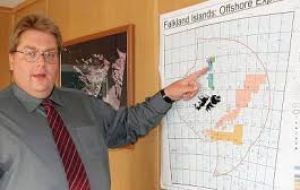MercoPress. South Atlantic News Agency
Falklands' oil industry advances despite the fall in oil prices, according to FT
 Sam Moody insists that a smaller scale plan at Sea Lion with an initial outlay of 1.8bn dollars or less, could guarantee the beginning of production before 2020”.
Sam Moody insists that a smaller scale plan at Sea Lion with an initial outlay of 1.8bn dollars or less, could guarantee the beginning of production before 2020”.  Premier CEO Durrant said the company can only support the investment if Brent crude prices significantly and effectively stabilize above 50 dollars a barrel.
Premier CEO Durrant said the company can only support the investment if Brent crude prices significantly and effectively stabilize above 50 dollars a barrel.  Stephen Luxton insists that Falklands conditions are a good deal for oil companies and one of the most generous conditions in the world.
Stephen Luxton insists that Falklands conditions are a good deal for oil companies and one of the most generous conditions in the world. A recent piece from the Financial Times points to the fact that despite the remoteness of the Falkland Islands, the fall of international oil prices and the ongoing conflict with Argentina, this has not impeded small oil and gas companies from going ahead with exploration, and hopefully before 2020 production, in the Islands waters.
In effect a new round of drilling is currently taking place in Falklands waters, six wells at a total cost of 400 million dollars, with most of the funds coming from Premier Oil (UK) and Noble Energy (US), and among smaller partners Rockhopper Exploration and Falkland Oil & Gas ltd, writes Michael Kavanagh.
The article states that oil was first discovered in Falklands' waters in 2010, at Sea Lion prospect, to the north of the Islands. Rockhopper did the discovery, but the potential was not large enough to attract the big oil companies, but fiscal income from the exploitation could certainly make a difference for the scarce Islands' population.
The original idea was for production to begin in 2017, but remoteness, delays in obtaining financial support plus the collapse of oil prices have delayed the goal.
“However Rockhopper CEO, Sam Moody insists that a smaller scale plan at Sea Lion with an initial outlay of 1.8bn dollars or less, could guarantee the beginning of production before 2020”.
Nevertheless Moody is convinced that Sea Lion will be developed no matter the success or non success of the current round of drilling in Falklands' waters. “We're talking of nearly 400 million barrels of recoverable crude. I don't recall the last time such a discovery took place in the British North Sea”.
However the decision rests on Premier Oil, which trades at the FTSE 250, and purchased a majority stake at Sea Lion and is the operator since 2012. Last January, according to FT, Premier CEO Tony Durrant said that the company can only support the investment if Brent crude prices significantly and effectively stabilize above 50 dollars a barrel.
This also involves taking into account a balance between future oil prices and fiscal conditions for the companies operating in the Falklands. The local government expects to receive 9% in royalties from oil extraction plus a 26% tax on companies profits.
Falklands' Mineral Resources director Stephen Luxton insists it is a good deal and one of the most generous conditions in the world. “It's an important principle to keep fiscal stability since the companies are planning 15 to 25 year projects” and thus “companies need a good return to work here in the Islands, a remote area”.
Finally the FT article points out that Luxton does not want to speculate as to how much money Sea Lion development would mean for the Islands economy and government coffers, but “it will make a big difference”.
The Falklands have less than 3.000 population, with an annual GDP of 100 million pounds which works out at 30.000 pounds per capita. Traditionally the Islands lived off wool and sheep farming, but since the 1982 conflict fisheries and particularly squid have made a huge difference. However this could further change if Sea Lion effectively advances and is developed. In the first stage of development extraction would be 60.000bpd and the Falklands government fiscal income from oil could reach 2.5bn dollars in 15 years.




Top Comments
Disclaimer & comment rules-

-

-

Read all commentsAn honest and realistic assessment with which not even “idiot child/payaso/mamarracho/paulcedron” can possible disagree - even if he is more knowledgable than the FT!
Mar 30th, 2015 - 09:27 am 0Can you imagine the complete shambles this project would be in if the Argy nazis were involved? The brent break even price would need to be much higher to pay all the G and C they would be demanding.
Mar 30th, 2015 - 10:24 am 0The stop valve is about to be opened and the black gold will flow at an alarming rate. With the huge investment already made the oil companies are not going to disappear any time soon. We Islanders have always know about the reality of oil and some of us were aware that Argentina had indeed found oil in the early 1970's and they were very close to Falklands waters at the time.
Mar 30th, 2015 - 11:10 am 0So it is not a question of IF but When the oil starts to flow and boy is it going to change the way of life of the Islanders. The population could quadruple in the next 20 years giving the people an even stronger say in the way they choose to go forward.
Certainly looks like some very interesting financial times ahead . But we must never forget that money is not everything but a way of life is and that we must hold onto no matter what.
Commenting for this story is now closed.
If you have a Facebook account, become a fan and comment on our Facebook Page!